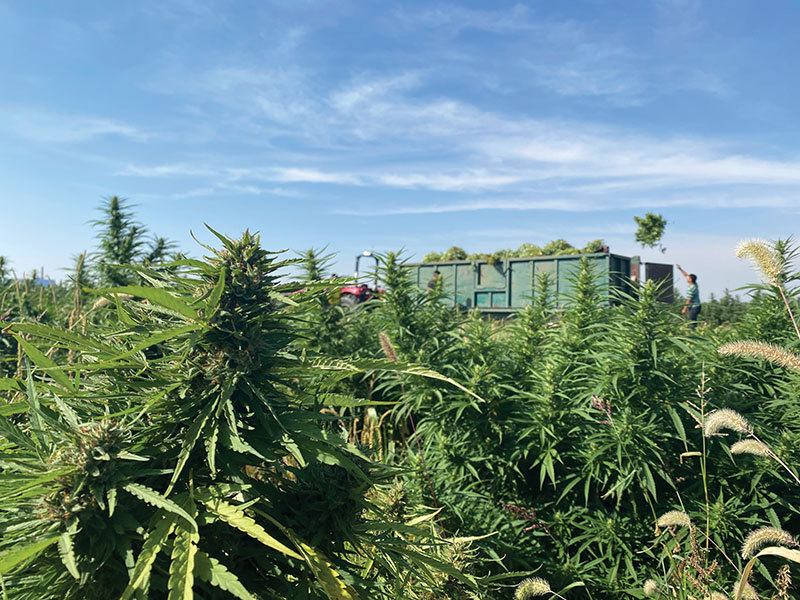
May 9, 2022
NuuMe Organics shares methods used to support biodiversity, soil health
Cannabidiol (CBD) hemp production is very limited on the inputs that can be used to produce a healthy crop, leading growers to use natural methods. Some growers, however, go above and beyond by seeking organic certification. In 2016, NuuMe Organics — then doing business as Nature’s Love — was the first hemp farm to achieve organic certification from the U.S. Department of Agriculture. NuuMe Organics continues supporting its goal of producing hemp extract products with the most holistic and therapeutic value through farming methods that support biodiversity and soil health.
“It’s super important to grow anything that’s going to be consumed by people in as natural of a way, and as chemical-free of a way as possible,” says Dexter Rice, founder and CEO of NuuMe Organics.
The Brush, Colorado-based farm, located a little over an hour northeast of Denver, dedicates 7,500 square feet of greenhouse space for transplant production and then moves those plants to its 15 acres of outdoor space.
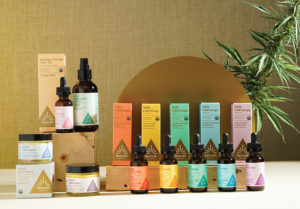
Soil Stewardship
Fostering the soil biology on the farm’s clay loam soil is a key objective at NuuMe Organics. No pesticides, herbicides, fungicides or synthetic fertilizers are used on the farm. Rice tries to avoid tillage as much as possible to avoid disturbing the soil. When tillage is unavoidable, he says it’s kept shallow.
Hemp transplants are planted in wide rows about six feet apart to allow for companion crops in between. “We’re putting down highly varied seeding of different things to grow in between the rows,” says Rice. “Plus, obviously some native plants (a.k.a., weeds) are growing up in there.”
In the winter, cover crops grow to make sure there’s always something rooted in the soil. Cover crops used include winter rye, clovers, legumes, grasses, forbes, and more. Rice has found that applying composts also makes a huge difference in the soil.
“We’ve had great success with chicken litter and, to some degree, beef manure,” he says. “But you have to be really careful with any kind of cow manure or other kinds of manures like that that are high in salt. [Hemp plants are] very sensitive to the salts. I think that’s because of the fact that they haven’t been heavily selectively bred. Most of the corn and hay and these big acre crops have been intensively bred to tolerate the amount of salt that’s in the water and in the soil just everywhere these days. And these hemp plants haven’t been bred for that.”
Hemp plants are known to soak everything in the soil they’re in — good or bad.
“It’ll very easily pull toxins out of the soil and up into the tissue so that’s something that people have to be careful about and conscious of,” Rice says. “You don’t want to be putting any junk in the soil because it’s probably going to end up in the plant.”
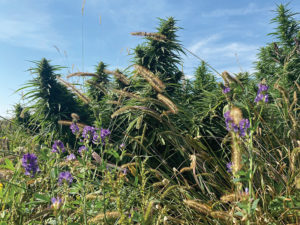
Water Management
Subsurface drip irrigation is used on the farm. Rice recommends keeping drip lines flushed on a regular basis to avoid having them get plugged. The farm previously used water sensors buried down in the soil but Rice says the system resulted with the crop being overwatered.
“Hemp is very sensitive to that, especially in the later stages,” he says. “It really likes to kind of dry out as it gets through the end of flowering. I think it’s because it’s a riparian plant and it evolved growing next to rivers. The rivers get high in the spring and then they’re much lower in the fall and I think it really likes that. It really likes to dry out a bit and [that] makes the roots reach and expand.”
Rice notes that the year they ended up overwatering with the sensors, the crop experienced a potassium deficiency despite cutting off watering about six weeks before harvest. He believes it was due to how much water was in the soil column from the overwatering.
“For us, we have tons of potassium in our soil and we add some calcium in the form of gypsum. Then we also apply some sulfur to free up calcium in the soil, but even though our soil has way more potassium than the plants would ever want, we still ended up with that severe potassium deficiency just due to a little bit too much water in the soil,” says Rice.
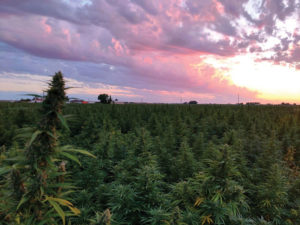
Pest Pressure
The only pest the farm has had to contend with is various types of borers. Diligence when scouting has been important as “there doesn’t seem to be any natural predator, at least in this area, that goes after that,” says Rice.
The Eurasian hemp borer and European hemp borer are two common pests in cannabis sativa L. in the eastern part of the state, according to Colorado State University. The Eurasian hemp borer is the caterpillar stage of a small moth that tunnels into stems and buds. The European corn borer is larger than the Eurasian hemp borer but tends to stay away from bud and seed developing parts of the plant.
Rice says the variety of crops planted within the hemp fields feeds into NuuMe’s pest management strategy.
“We find [that] when it’s not a monocrop, when there’s a diversity of different plants, we have a natural population of beneficial insects,” he says. “The ecosystem of insects keeps itself in check because it’s allowed to grow and evolve in a varied set of plants.”
As a pioneer in the hemp industry, NuuMe Organics has been around long enough to watch the industry evolve — from trending products and consumer demand to the types of players entering the game.
“When it was more of a legal gray area you had to really care about what you were doing to get into it and take that risk,” says Rice. “As time went on, and especially when the Farm Bill was passed and went into effect, it was just a lot more of big money interests trying to go for the gold rush. That kind of diluted or polluted the culture to some degree.”
“There’s been a lot of consolidation over the past year to two years. At this point it’s either some of the big money that’s actually done it right and hung in through the storm … and the smaller people that really, really care about what they’re doing and have also been able to, luckily, weather the storm and have a good enough customer base of people that keep coming back and keep spreading the word. That’s what we’ve been lucky with.”
From Seed to Bottle
Sub-Zero Extracts is the bulk hemp extract brand for NuuMe Organics. The extraction facility is located next tot he farm and uses organic ethanol. The facility earned organic certification from USDA in 2019. The facility is also cGMP (current Good Manufacturing Practices) compliant. Sub-Zero Extracts aims to produce the most therapeutically full-spectrum organic extracts, says founder Dexter Rice.
The company strays away from isolating cannabinoids and using harsher solvents.
“To me, it’s such a shame to extract something into an isolate because you generally have to expose it to more heat, to more chemicals,” says Rice. You’re doing all of that, reducing the therapeutic value of say the CBD itself and at the same time you’re stripping away the value of all the other minor components that are present — the terpenes, the polyphenols, the accessory cannabinoids in small amounts.”
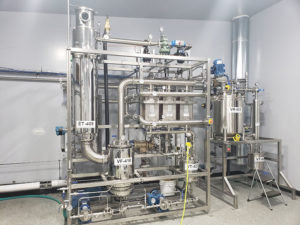
Rice says the bulk extract business has been tough the past couple of years due to market saturation and dwindling market prices. Two and a half years ago, bulk materials were $9,000 a kilo and now it’s tough to sell it for $3,000 a kilo, he says. But the ability to make a product that consumers believe in makes the industry challenges worth it.
“If it wasn’t for the extremely loyal customers of our consumer products, we definitely wouldn’t have been able to make it through this time,” says Rice. “People really love our products. We get amazing rave reviews and they spread the word. That’s what’s really kept us going through the most difficult times in the industry.”
To see more on hemp, visit Organic Grower’s sister publication Hemp Production News››






